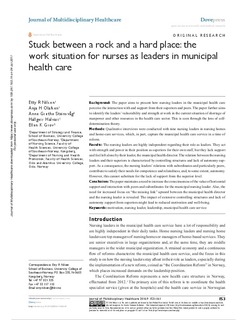| dc.contributor.author | Nilsen, Etty | |
| dc.contributor.author | Olafsen, Anja Hagen | |
| dc.contributor.author | Steinsvåg, Anne Grethe | |
| dc.contributor.author | Halvari, Halgeir | |
| dc.contributor.author | Grov, Ellen Karine | |
| dc.date.accessioned | 2017-07-04T06:17:56Z | |
| dc.date.available | 2017-07-04T06:17:56Z | |
| dc.date.created | 2016-04-11T14:00:14Z | |
| dc.date.issued | 2016 | |
| dc.identifier.citation | Journal of Multidisciplinary Healthcare. 2016, 9 153-161. | nb_NO |
| dc.identifier.issn | 1178-2390 | |
| dc.identifier.uri | http://hdl.handle.net/11250/2447648 | |
| dc.description.abstract | Background: The paper aims to present how nursing leaders in the municipal health care perceive the interaction with and support from their superiors and peers. The paper further aims to identify the leaders’ vulnerability and strength at work in the current situation of shortage of manpower and other resources in the health care sector. This is seen through the lens of self-determination theory. Methods: Qualitative interviews were conducted with nine nursing leaders in nursing homes and home-care services, which, in part, capture the municipal health care service in a time of reform. Results: The nursing leaders are highly independent regarding their role as leaders. They act with strength and power in their position as superiors for their own staff, but they lack support and feel left alone by their leader, the municipal health director. The relation between the nursing leaders and their superiors is characterized by controlling structures and lack of autonomy support. As a consequence, the nursing leaders’ relations with subordinates and particularly peers, contribute to satisfy their needs for competence and relatedness, and, to some extent, autonomy. However, this cannot substitute for the lack of support from the superior level. Conclusion: The paper maintains a need to increase the consciousness of the value of horizontal support and interaction with peers and subordinates for the municipal nursing leader. Also, the need for increased focus on “the missing link” upward between the municipal health director and the nursing leader is revealed. The impact of extensive controlling structures and lack of autonomy support from superiors might lead to reduced motivation and well-being. | nb_NO |
| dc.language.iso | eng | nb_NO |
| dc.rights | Navngivelse-Ikkekommersiell 4.0 Internasjonal | * |
| dc.rights.uri | http://creativecommons.org/licenses/by-nc/4.0/deed.no | * |
| dc.subject | motivation | nb_NO |
| dc.subject | nursing leader | nb_NO |
| dc.subject | leadership | nb_NO |
| dc.subject | municipal health care service | nb_NO |
| dc.title | Stuck between a rock and a hard place: the work situation for nurses as leaders in municipal health care | nb_NO |
| dc.type | Journal article | nb_NO |
| dc.type | Peer reviewed | nb_NO |
| dc.source.pagenumber | 153-161 | nb_NO |
| dc.source.volume | 9 | nb_NO |
| dc.source.journal | Journal of Multidisciplinary Healthcare | nb_NO |
| dc.identifier.doi | 10.2147/JMDH.S100640 | |
| dc.identifier.cristin | 1349923 | |
| cristin.unitcode | 222,70,1,0 | |
| cristin.unitcode | 222,90,3,0 | |
| cristin.unitname | Institutt for strategi og økonomi | |
| cristin.unitname | Institutt for sykepleievitenskap - Drammen | |
| cristin.ispublished | true | |
| cristin.fulltext | original | |
| cristin.qualitycode | 1 | |

